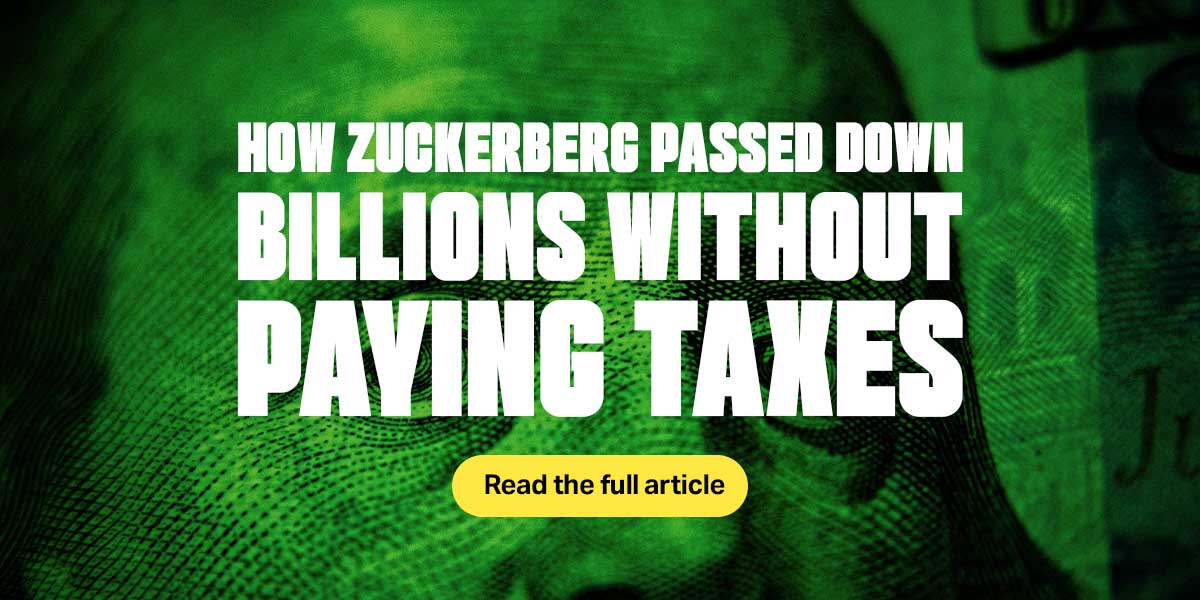While you’re maxing out your 401(k) and hoping your estate planning attorney knows what they’re doing, Mark Zuckerberg just transferred $3 billion in Facebook stock to his heirs for the cost of a nice dinner.
No, that’s not a typo. And no, it’s not illegal.
In 2012, when Facebook went public, Zuckerberg used a structure called a GRAT to move billions of dollars worth of stock to his family members while paying virtually nothing in gift or estate taxes. His co-founder Dustin Moskovitz did the same thing. So did the founders of Google, Tesla, and countless other tech billionaires you’ve never heard of.
You won’t hear this from your CPA. You won’t read about it in Forbes’ “Top 10 Estate Planning Tips.” And you sure as hell won’t learn about it from your financial advisor who’s still talking about term life insurance and Roth conversions.
This is the wealth game you were never invited to play.
The GRAT Game: Legal Tax Magic
A GRAT—Grantor Retained Annuity Trust—sounds boring enough to put you to sleep. That’s intentional. The most powerful wealth tools are deliberately wrapped in academic language that keeps ordinary people from understanding them.
Here’s how it works in plain English: You transfer assets into a trust, but you retain the right to receive payments back for a specific period—usually two to four years. If the assets grow faster than the IRS assumed they would, all that excess growth passes to your heirs tax-free.
Think of it like this: You give your kids a lottery ticket, but you keep the right to get your money back if it doesn’t win. If it hits the jackpot, they keep everything above what you paid for the ticket.
Zuckerberg transferred Facebook shares worth $37.58 each into his GRAT in May 2012, just before the IPO. The IRS calculated the “gift value” of those shares at essentially zero because of the structure.
When Facebook’s stock price exploded, all that growth—billions of dollars—passed to his family members without triggering a single dollar in gift tax.
Why Your Estate Attorney Isn’t Playing This Game
The dirty secret of estate planning is that most attorneys are playing checkers while the ultra-wealthy are playing 4D chess. They’re focused on wills, trusts, and tax forms when the real action happens in structures most people have never heard of.
GRATs require specific expertise, sophisticated modeling, and the kind of assets that make them worthwhile. Your local estate attorney who handles suburban families isn’t thinking about transferring hundreds of millions in pre-IPO stock. They’re thinking about avoiding probate and saving on state taxes.
But here’s what’s really happening: The tax code is written by and for people who own and control assets, not people who earn paychecks. Every “loophole” you’ve heard politicians complain about was deliberately written into the law by people who understood exactly how it would be used.
GRATs aren’t accidents. They’re features, not bugs.
The Math That Breaks Your Brain
Let’s put this in perspective using numbers that might actually apply to you.
Say you own a business worth $5 million today, but you believe it could be worth $50 million in five years. Using a GRAT, you could transfer that business to your heirs today and lock in its current $5 million valuation for gift tax purposes.
If you’re right about the growth, your heirs receive a $50 million business while you pay gift taxes on only $5 million. The $45 million in growth passes completely tax-free.
Now scale that up to Zuckerberg’s level. He wasn’t transferring a $5 million business—he was transferring billions in pre-IPO stock that he knew had massive upside potential. The same math applies, just with more zeros.
This is why billionaire families stay billionaire families. They’re not just building wealth—they’re engineering its transfer across generations without letting the government take a meaningful cut.
The Real Game vs. The Fake Game
While you’re worried about contributing to your kids’ 529 plans and buying life insurance, wealthy families are playing an entirely different sport.
The fake game is what most people play: work hard, save money, pay taxes, die, and hope there’s something left for the kids after estate taxes.
The real game is understanding that wealth transfer happens during life, not after death. It happens through planning, not hoping. And it happens using structures that treat assets as chess pieces, not static savings accounts.
Yes, this is legal. No, your tax guy probably isn’t playing at this level. And no, the rules aren’t likely to change anytime soon because the people who could change them are the same people who benefit from them.
The Questions You Should Be Asking
The next time someone tells you about the “death tax” or “estate planning,” ask yourself: Why are some families able to transfer billions across generations while paying almost nothing in taxes, while everyone else gets crushed by a 40% estate tax rate?
The answer isn’t that they’re smarter or work harder. The answer is that they’re playing by a different set of rules—rules that were written specifically for people who own appreciating assets and have the sophistication to use them properly.
The real question isn’t whether these strategies are fair. The real question is whether you’re going to keep playing checkers while others are playing chess.
Because while you’re reading this article, somewhere a billionaire just transferred another $100 million to their heirs for the cost of filing some paperwork.
The game is already being played. The only question is whether you’re going to learn the rules.






